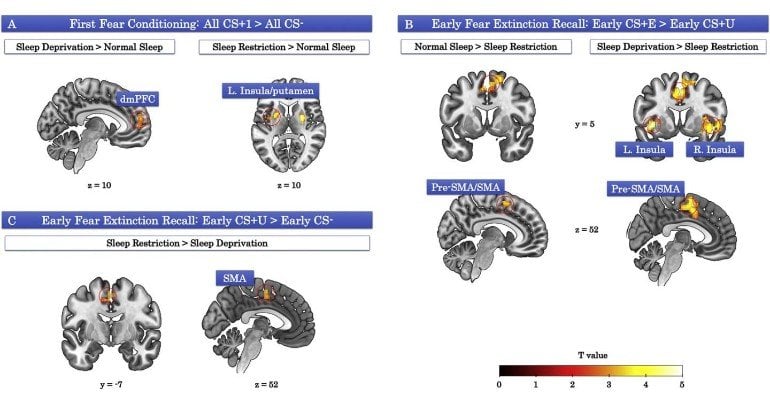Summary: Sleep deprivation reduces the brain’s ability to unlearn fear-related memories, a new study reports.
Source: Elsevier
Sleep is crucial for consolidating our memories, and sleep deprivation has long been known to interfere with learning and memory. Now a new study shows that getting only half a night’s sleep – as many medical workers and military personnel often do – hijacks the brain’s ability to unlearn fear-related memories. That might put people at greater risk of conditions such as anxiety or posttraumatic stress disorder.
The study appears in Biological Psychiatry: Cognitive Neuroscience and Neuroimaging, published by Elsevier.
“This study provides us with new insights into how sleep deprivation affects brain function to disrupt fear extinction,” said Cameron Carter, MD, Editor of Biological Psychiatry: Cognitive Neuroscience and Neuroimaging.
The researchers, led by Anne Germain, PhD, at the University of Pittsburgh and Edward Pace-Schott, PhD, at Harvard Medical School and Massachusetts General Hospital, studied 150 healthy adults in the sleep laboratory. One third of subjects got normal sleep, one third were sleep restricted, so they slept only the first half the night, and one third were sleep deprived, so they got no sleep at all. In the morning, all the subjects underwent fear conditioning.
“Our team used a three-phase experimental model for the acquisition and overcoming of fearful memories while their brains were scanned using functional magnetic resonance imaging,” said Dr. Pace-Schott. In the conditioning paradigm, subjects were presented with three colors, two of which were paired with a mild electric shock. Following this fear conditioning, the subjects underwent fear extinction, in which one of the colors was presented without any shocks to learn that it was now “safe.” That evening, subjects were tested for their reactivity to the three colors, a measure of their fear extinction recall, or how well they had “unlearned” the threat.
Brain imaging recorded during the tasks showed activation in brain areas associated with emotional regulation, such as the prefrontal cortex, in people who got normal sleep. But the brain activity looked very different in people with restricted sleep, said Dr. Pace-Schott. “We found that among the three groups, those who had only gotten half a night’s sleep showed the most activity in brain regions associated with fear and the least activity in areas associated with control of emotion.”
Surprisingly, people who got no sleep lacked the brain activation in fear-related areas during fear conditioning and extinction. During the extinction recall 12 hours later, their brain activity looked more similar to those with normal sleep, suggesting that a limited night of sleep may be worse than none at all.
The researchers hypothesize that sleeping only half the night results in a loss of rapid eye movement (REM) sleep, which has been shown to be important for memory consolidation and usually happens toward the end of a normal sleep period.

Dr. Carter said the study used “noninvasive brain imaging to give us a novel window into how sleep deprivation disrupts the normal fear extinction mechanisms and potentially increases vulnerability to posttraumatic stress symptoms.”
“Medical workers and soldiers often have curtailed or interrupted sleep rather than missing an entire night’s sleep,” Dr. Pace-Schott said. “Our findings suggest that such partially sleep-deprived individuals might be especially vulnerable to fear-related conditions such as posttraumatic stress disorder.”
Funding: This study was funded by the Military Operational Medicine Research Program, Log#11293006; PI: Germain.
About this memory research news
Source: Elsevier
Contact: Rhiannon Bugno – Elsevier
Image: The image is credited to Elsevier
Original Research: Closed access.
“Partial and Total Sleep Deprivation Interferes with Neural Correlates of Consolidation of Fear Extinction Memory” by Anne Germain et al. Biological Psychiatry: Cognitive Neuroscience and Neuroimaging
Abstract
Partial and Total Sleep Deprivation Interferes with Neural Correlates of Consolidation of Fear Extinction Memory
Background
We assessed the impact of total and partial sleep loss on neural correlates of fear conditioning and extinction learning and recall in healthy young adults.
Methods
Participants (56.3% female, age 24.8±3.4) were randomized to a night of normal sleep (NS, n=48), sleep restriction (SR, n=53), or sleep deprivation (SD, n=53). All completed fear conditioning and extinction learning phases the following morning. Extinction recall was tested in the evening of the same day. Task-based contrasts were modeled at the beginning, end and across fear conditioning and extinction learning phases, and at the beginning of extinction recall. These contrasts were compared between the 3 groups using ANOVA. Nonparametric permutation corrected analyses using a cluster-determining threshold of p<0.005 and a family-wise error of p<0.05.
Results
At the end of fear conditioning, NS activated medial prefrontal (PFC) regions, SR activated motor areas and SD showed no significant activations. Across extinction learning, only NS activated both salience (fear) and extinction (regulatory) areas. For extinction recall, SD activated similar regions as NS across extinction learning, while SR activated salience and motor areas. During early fear conditioning, compared to NS, SD activated more medial PFC and SR activated more salience-network areas. For extinction recall, NS activated more PFC areas and SD activated more of both salience- and extinction-related areas than SR.
Conclusions
Relative to NS, SR may enhance fear- and diminish extinction-related activity, whereas SD may delay engagement of extinction learning. Findings may have clinical implications for populations and occupations in which sleep loss is common.






